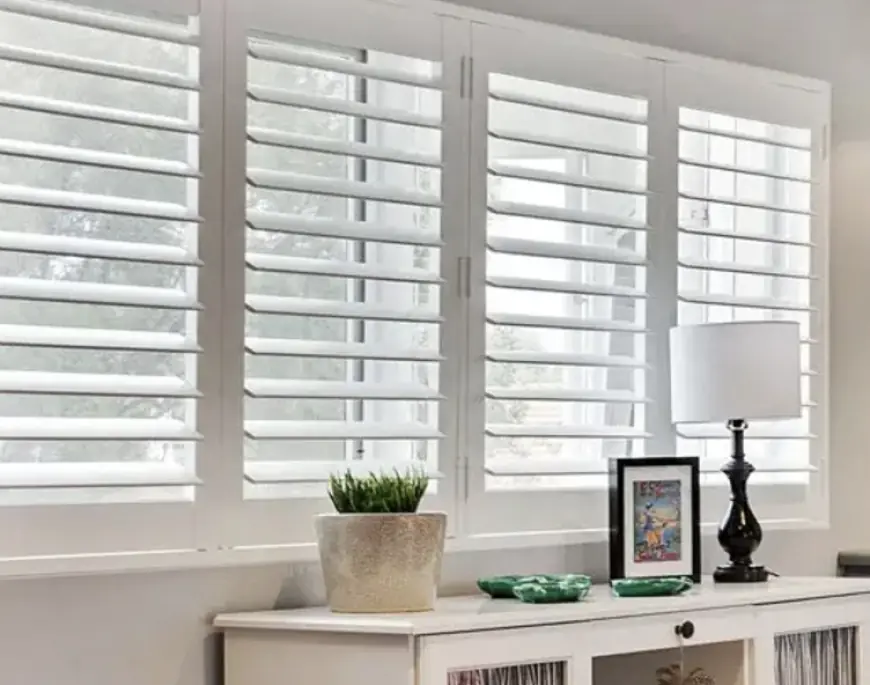Choosing the Right Material for Your Plantation Shutters

Plantation shutters are a timeless window treatment that combines functionality, elegance, and durability. They not only enhance your home’s aesthetic appeal but also provide insulation, privacy, and light control. However, selecting the right material for your plantation shutters can be daunting with the variety of options available. Each material has unique characteristics, making it more or less suitable depending on your specific needs. Here’s a comprehensive guide to help you choose the perfect material for your pvc plantation shutters.
1. Common Plantation Shutter Materials
Wooden Plantation Shutters
Wood is the classic choice for plantation shutters, admired for its natural beauty, versatility, and warmth. Some popular wood types used include basswood, cedar, and poplar.
Advantages:
-
Aesthetic Appeal: Wooden shutters exude elegance, offering a natural and premium look.
-
Customization: They can be stained or painted to match any interior design.
-
Lightweight Yet Strong: Basswood, in particular, is both durable and easy to handle.
Disadvantages:
-
Cost: Wooden shutters are generally more expensive than other materials.
-
Moisture Sensitivity: Wood can warp or swell in humid areas, making it unsuitable for bathrooms or kitchens.
PVC Plantation Shutters
PVC (Polyvinyl Chloride) shutters are a popular modern option due to their affordability and durability.
Advantages:
-
Moisture Resistance: Ideal for areas with high humidity, such as bathrooms or laundry rooms.
-
Low Maintenance: PVC shutters are easy to clean and resist cracking, fading, and peeling.
-
Affordable: Cost-effective compared to wood without compromising on appearance.
Disadvantages:
-
Weight: PVC shutters can be heavier than wood or aluminum, which may not be suitable for larger windows.
-
Limited Customisation: They cannot be stained and may come in fewer colors.
Composite Plantation Shutters
Composite shutters, also known as faux wood or engineered wood shutters, are made from a combination of wood fibers and resin.
Advantages:
-
Durability: More resistant to moisture than natural wood.
-
Cost-Effective: Offers the look of real wood at a lower price.
-
Insulation: Provides excellent thermal insulation, helping reduce energy bills.
Disadvantages:
-
Weight: Composite shutters are heavier than natural wood, making them less ideal for large windows.
-
Limited Refinishing: They cannot be restained or repainted as easily as wood.
Aluminum Plantation Shutters
Aluminum shutters are sleek, lightweight, and durable, often used in contemporary designs or outdoor applications.
Advantages:
-
Weather Resistance: Perfect for outdoor areas like patios or balconies.
-
Low Maintenance: Resistant to rust, corrosion, and pests.
-
Modern Look: Provides a sleek, industrial aesthetic.
Disadvantages:
-
Limited Insulation: Aluminum shutters don’t offer as much thermal insulation as wood or composite options.
-
Cost: High-quality aluminum shutters can be expensive.
2. Factors to Consider When Choosing Materials
a. Room Environment
-
For humid areas like bathrooms and kitchens, PVC or aluminum is the best choice due to their moisture resistance.
-
In living rooms and bedrooms, wood or composite shutters can add a warm, sophisticated touch.
b. Budget
-
PVC and composite shutters are budget-friendly options that still offer durability and style.
-
If you’re willing to invest more, wooden shutters provide unparalleled elegance and value.
c. Maintenance Requirements
-
PVC and aluminum shutters are low-maintenance, making them ideal for busy households.
-
Wooden shutters require more care, including occasional refinishing or staining to maintain their appearance.
d. Longevity
-
For long-lasting durability, aluminum and composite shutters outperform wood in challenging environments.
-
Wooden shutters, while slightly less durable in some conditions, can last decades with proper care.
e. Aesthetic Preferences
-
Wooden shutters are perfect for traditional or rustic interiors, thanks to their natural charm.
-
PVC and aluminum shutters suit modern or minimalist designs.
3. Balancing Style and Functionality
Plantation shutters are both a design feature and a functional element of your home. While style plays a significant role in your choice, ensure the material aligns with your practical needs. For example, homeowners in coastal areas may prefer aluminum shutters due to their resistance to salty air, while those in colder climates might benefit from the insulating properties of composite or wood.
4. Sustainable Options
For eco-conscious homeowners, consider plantation shutters made from sustainable materials. Look for:
-
FSC-Certified Wood: Ensures the wood is sourced responsibly.
-
Recyclable Materials: Aluminum shutters are fully recyclable.
5. Professional Installation and Customisation
No matter the material, professional installation is crucial to ensure your pvc plantation shutters fit perfectly and operate smoothly. Customization options, such as louver size, frame style, and color, further enhance the functionality and appearance of your shutters.
Conclusion
Choosing the right material for your plantation shutters involves balancing aesthetics, durability, and budget. Wooden shutters offer timeless elegance, PVC and composite shutters provide durability and cost-effectiveness, and aluminum shutters are perfect for outdoor use or modern interiors. By assessing your home’s environment, your style preferences, and your practical needs, you can select shutters that enhance your home’s beauty and functionality for years to come.
Investing in high-quality plantation shutters is an excellent way to elevate your home. With the right material, your shutters will not only complement your space but also stand the test of time. Whether you’re renovating or building from scratch, plantation shutters are a stylish and practical choice that adds lasting value to your property.












